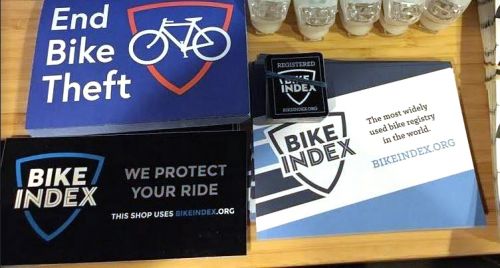Editor's note: A version of this story ran in the March issue of BRAIN, part of our series of articles about smash and grab thefts.
PORTLAND, Ore. (BRAIN) — The way J Allard sees it, 529 Garage is a combination of crimewatch, crime stoppers and motor vehicle registration. And it, along with Bike Index, might be the best way for retailers to protect their bikes.
While both systems were designed as a point-of-sale way to register a customer’s bike for no cost, Allard, CEO and co-founder, and Bike Index co-founder Bryan Hance recommend retailers pre-register entire fleets at once. In the event of a smash and grab, law enforcement will have instant database access, including photos and serial numbers.
“There’s not a bike in the shop that the police can’t tie back to us,” Allard said. “That’s vital. That changes the math in a couple ways. The primary way is if that bike rolls out the door, and a cop spots that bike with a known bad guy that obviously is not theirs, they can run it and tie it right back to the shop. Whereas an unregistered bike they can’t. By pre-register the bikes, they can use that as a selling feature. We’re really concerned about this bike theft and we’re protecting the bikes right from birth.”
Allard, a former Microsoft executive, helped develop the app and database six years ago. The Vancouver Police Department, dealing with a high rate of bicycle thefts, funded the venture along with the city before it was launched nationwide. To date, it has registered nearly 1.6 million bikes.
“This system works,” Allard said. “There’s no rocket science to it.”
Allard said 529 Garage has stolen bikes recovered weekly but doesn’t have a total number “because people panic when they lose a bike, but after they get it back, they often don’t report back. It’s not possible to erase (theft), but our goal is to drop thefts by 50% and to get police to be able to return 50% or more of the bikes they recover. Today that number is sub 5% often sub 2%.”
529 Garage generates revenue by charging for the “Shield” tamper-resistant bike stickers ($10 or four for $25 for retail package). They are offered in bulk for retailers and city agencies and police.
“Recognizing the tight margins and high rents for most IBD’s, we definitely don’t expect retail to fund the program,” Allard said. “A big part of our goal is to help the local bike shop financially, so having them lose money on this program is backwards.”
Bike Index, started in 2013, works similarly. A nonprofit on a “shoestring budget,” Hance said it had a Kickstarter campaign initially. Nowadays, they get by with donations from users and “larger rollouts from cities and schools that keep the lights on and fund future Bike Index development.”
Like 529 Garage, Bike Index has an app and database and enables tracking stolen bikes immediately.
“The minute it hits our system, a lot of things happen,” Hance said. “One, if something sketchy comes in, a mechanic or someone buying a bike or encountering one of these bikes, they can whip out their phone and check the bike out. Two, there are a ton of law enforcement officers who are doing the same thing. We sort of blast pictures, details, the city, the location. If you get robbed at noon, we can have that bike picture and data in front of thousands of people by 1. And in a small town that goes a long way.”
Bike Index has 310,387 bikes registered as of last month. Of those, 73,567 were stolen and 6,678 recovered, Hance said.
Before 529 Garage and Bike Index, getting the word out on the street about a theft was slow.
“If you’re a shop that has been robbed, you submit all of your paperwork,” Hance said. “You do all of your reporting and file a police report. If that happened at noon, and they pull a guy over at 6 p.m. with a truck full of bikes, and they run the serial numbers, those bikes won’t show up. And that’s sadly true if it’s a week later, two weeks later or even a month later in some of these districts we’ve run into.”
As a further deterrent, 529 Garage and Bike Index help retailers promote registration inside stores and on bicycles themselves with small stickers.
“We’ve done that to tell thieves, ‘Hey this bike is registered,’” Allard said, noting the 529 Garage “Shield” stickers for seat tubes. “We made a bigger version of that for the store that says, ‘Hey this store participates in this program.’ And they get hit less. Put the word out there. We’re serious about bike theft. Anything you can do to unsettle someone casing the place or thinking about breaking in.”
Count Vancouver Police Department detective Rob Brunt as believer in bike registration.
“It’s best to approach retailers in their down season, December, January, February,” said Brunt, who’s also a liaison for 529 Garage. “We can get in when they’re not super busy.”


